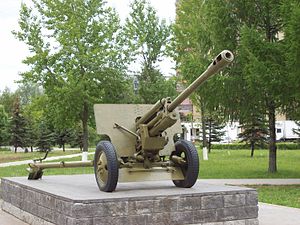76 mm divisional gun M1942 (ZiS-3)
| 76-mm divisional gun M1942 (ZiS-3) | |
|---|---|

ZiS-3 in Nizhny Novgorod, Russia.
|
|
| Type | Anti-tank field gun |
| Place of origin | Soviet Union |
| Production history | |
| Designer | design bureau of No. 92 Artillery Factory headed by V. G. Grabin |
| Produced | 1941–1945 |
| No. built | 103,000+ |
| Specifications | |
| Weight | combat: 1,116 kg (2,460 lbs) travel: 2,150 kg (4,730 lbs) |
| Barrel length | 42.6 calibers |
| Crew | 7 artillerymen |
|
|
|
| Shell | 76.2 × 385 mm. R |
| Caliber | 76.2 mm (3 in) |
| Carriage | split trail |
| Elevation | -5° to 37° |
| Traverse | 54° |
| Rate of fire | up to 25 rounds per minute |
| Maximum firing range | 13.29 km (8.25 mi) |
The 76-mm divisional gun M1942 (ZiS-3) (Russian: 76-мм дивизионная пушка обр. 1942 г. (ЗиС-3)) was a Soviet 76.2 mm divisional field gun used during World War II. ZiS was a factory designation and stood for Zavod imeni Stalina ("factory named after Stalin"), the honorific title of Artillery Factory No. 92, which first constructed this gun.
Artillery Factory No. 92 began designing the ZiS-3 at the end of 1940. The ZiS-3 combined the light carriage from the 57 mm ZiS-2 anti-tank gun and the powerful 76.2 mm barrel from the F-22USV, the previous divisional field gun. A muzzle brake was added to reduce recoil, allowing it to be fired without damaging the lighter carriage. Production of the ZiS-3 made greater use of casting, stamping and welding than the F-22USV; compared to the F-22USV, the new weapon was produced with a third of the work, and two-thirds of the cost.
V. G. Grabin, the chief designer of Soviet medium caliber guns, ordered the gun's development on his own initiative. The state was not informed, and the first ZiS-3 was kept hidden. The state had little interest in light and medium field guns. German propaganda about the Neubaufahrzeug multi-turreted prototype tank convinced state authorities that German heavy tanks had exceptionally strong armour, which in turn reduced the value of smaller guns. Marshal Grigory Kulik, commander of Soviet artillery, ordered the production of light 45 mm anti-tank guns and 76.2 mm divisional field guns to be stopped.
The beginning of the Great Patriotic War revealed that the Soviets had overestimated German armour protection. Some were even vulnerable to large caliber DShK machine guns. Pre-war 76 mm divisional guns easily penetrated German vehicles, but nearly all of these guns were lost early in the war; some captured examples were remounted on German Panzerjäger self-propelled guns. Marshal Kulik ordered the F-22USV back into production. Artillery Factory No. 92, in cooperation with Grabin, put the ZiS-3 into mass production from December 1941 instead.
...
Wikipedia
